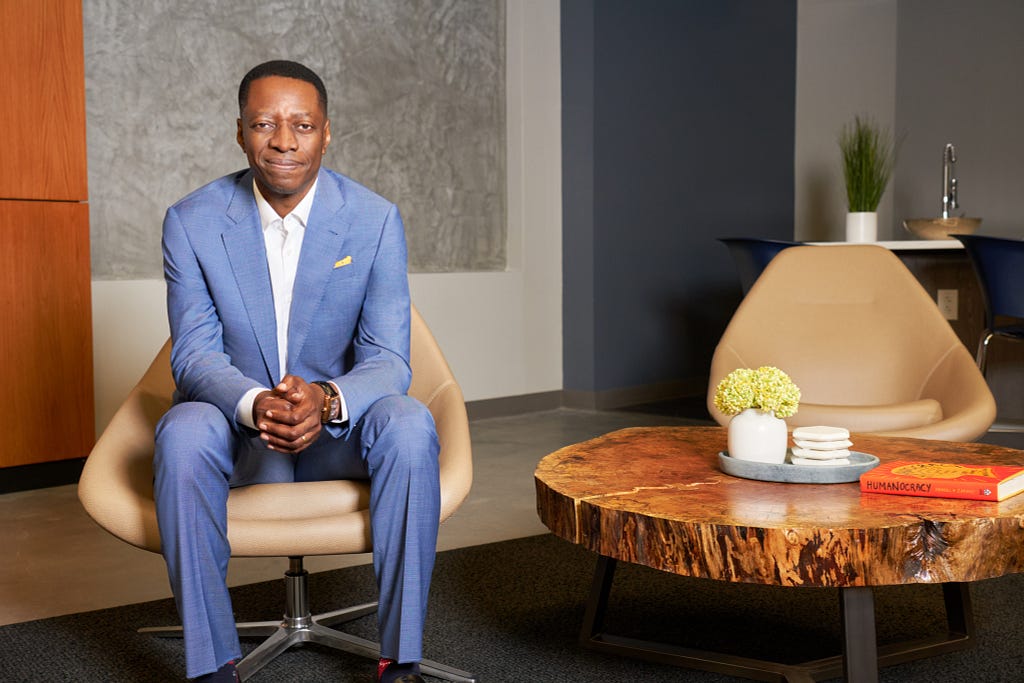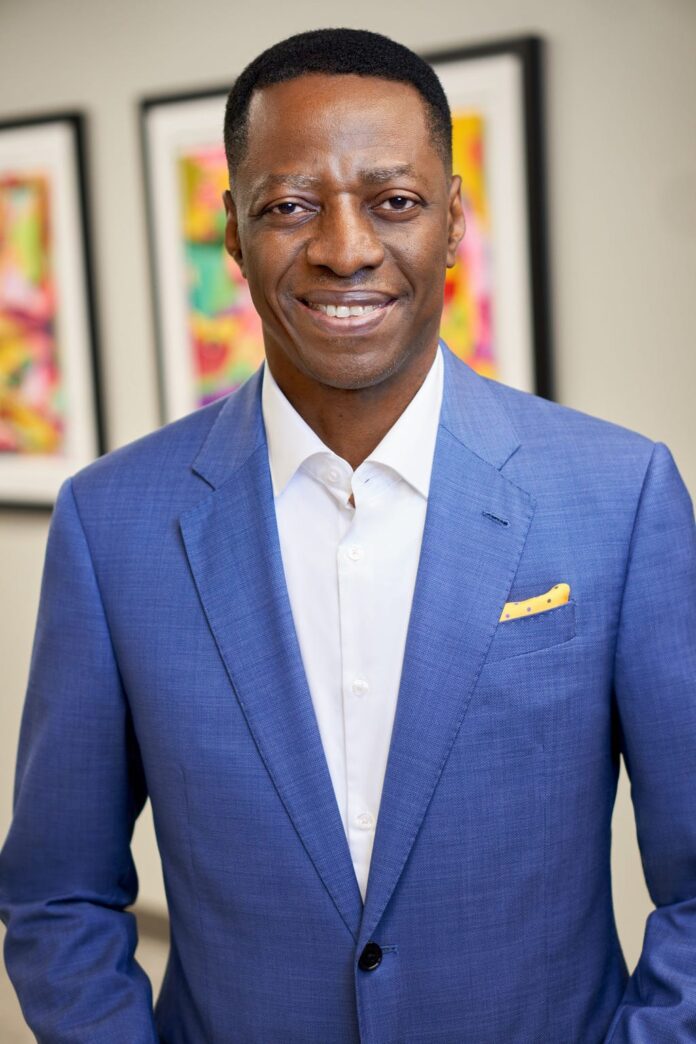Quiet Committing: Dr Sam Adeyemi Of Daystar Leadership Academy (DLA) On The Five Commitments High Impact Leaders Make & Keep To Themselves Daily
An interview with Karen Mangia
I commit to mentor and coach others, helping them to grow into the best version of themselves.
Quiet quitting is the emerging phenomenon of employee disengagement, essentially quitting on the job. What strategies do high-impact leaders deploy to motivate themselves and those around them to move from quiet quitting to quiet committing? Because, at its core, there is no change without commitment. Commitment to change ideas. Change beliefs. Change perspectives. Change routines, rituals and boundaries. Organizations change one commitment at a time. One leader at a time. As part of our series about “Quiet Committing: The Top Five Commitments High Impact Leaders Make & Keep To Themselves Daily”, we had the pleasure of interviewing Dr. Sam Adeyemi.
Atlanta-based Dr. Sam Adeyemi (SAY: Ah Day yeh me) is founder and executive director of Daystar Leadership Academy (DLA). More than 45,000 alumni have graduated from DLA programs, and more than 3 million CEOs and high performing individuals follow him on top social media sites. Dr. Sam’s new book is “Dear Leader: Your Flagship Guide to Successful Leadership.” He holds a Doctorate in Strategic Leadership from Virginia’s Regent University, and he is a member of the International Leadership Association. He and his wife, Nike (say Nee keh) have three children and founded Daystar Christian Centre in Lagos, Nigeria. Learn more at SamAdeyemi.com.
Thank you for making time for our visit. What was the first job you had, and how did that job shape the leader you are today?
Thank you for having me. My first job was as the Site Engineer on a construction site. The role taught me to value the contributions of team members and to relate to them with humility. I was fresh out of college, while the site supervisors that reported to me had decades of experience. Being the boss did not mean that I had to know everything, but it required me to leverage the knowledge of team members.
We’re talking about quiet quitting in this series. What’s the greatest lesson you’ve learned from a job you decided to quit?
I learned that major reflections, sometimes resulting from major life events, make people evaluate their life goals and values, and this can result in changing jobs. I was fortunate to work with kind people, but there came those times when I had to make major shifts to get closer to the fulfillment of my dreams.
Employee Engagement is top of mind for most organizations. How do you define an engaged employee?
An engaged employee is one that finds a great sense of meaning from their work and is therefore enthusiastic to do it.
Say more about your Employee Engagement portfolio. What’s working? What’s not working? And what are you piloting now to address the Quiet Committing trend?
We conducted an employee survey. Eighty percent of respondents indicated satisfaction with their engagement. Ten percent were passive on the subject, and another ten- percent declared disengagement. The review of salaries to cushion the effects of inflation, review of career paths for employees, and changes in the structure and leadership were responsible for the high level of engagement. Those who were passive or disengaged attributed this primarily to leadership, due to infrequent performance reviews and not feeling empowered to make decisions.
As goes the leadership, so goes the team. How do you hold leaders accountable for their own level of engagement?
I want to know the goals that leaders have set for their work and for their own growth. The most engaged people are usually self-motivated. I encourage leaders to have personalized Leadership Development Plans. I also want to ensure that they are good team players. Positive connections with teammates enhance engagement.
The first phase of the pandemic ushered in the phenomenon called The Great Resignation, where employees left organizations to pursue greater meaning and purpose. Then came The Great Reshuffle, where employees left organizations to pursue promotions, pay and perks. Now we’ve entered a third phase, Quiet Quitting, where employees are deeply disengaged. What do you believe to be the key drivers of Quiet Quitting?
The pandemic hit almost everyone with a reality we had never experienced. It caught many unaware in terms of preparedness for disruptions and caused many to evaluate their values. Many are quitting to align their work with their values and to ensure better preparedness for future disruptions. Many are also quitting because they have realized that their employers care more for profit or power than they care for people.
What do you predict will be the next phase in the evolution of the employer / employee landscape?
Quiet quitting is creating a scenario where one of the biggest factors affecting the employer/employee relationship is talent supply. Employers will need to evolve methods for increasing quiet committing.
What leadership behaviors need to evolve to improve employee engagement in a sustainable way?
Leaders need to drive their teams with vision and purpose. People want to do work that is meaningful. Also, leaders need to have genuine empathy with value for life. Knowing what is important to each person is key to motivating them. Leaders need to allow employees to grow, supplying the training and tools they need to succeed. Leaders need to listen well in order to provide feedback to their employees and to receive feedback from them also. Leaders need to recognize employees and give them credit for their hard work.

Change requires commitment and happens one choice at a time. What are the top five commitments you make and keep to yourself daily that have a material impact on those you lead?
1 . I commit to learn and grow daily, so I can continue to inspire those that I lead with new ideas.
2 . I commit to remember the vision, mission, and values of our organization, which give us a powerful “why” for the work we do.
3 . I commit to love others, recognizing and celebrating their value.
4 . I commit to mentor and coach others, helping them to grow into the best version of themselves.
5 . I commit to be honest with myself, with God, and with others.
What’s the most effective strategy you’ve discovered to get back on track when you break a commitment you’ve made?
I learn the lesson, forget the details, and try again.
Thank you for sharing these important insights. How can our readers further follow your work?
Thank you. Visit samadeyemi.com to know more about how I am raising high-impact leaders and shifting their mindsets to see possibilities.
We wish you continued success and good health!
Thank you!
About The Interviewer: Karen Mangia is one of the most sought-after keynote speakers in the world, sharing her thought leadership with over 10,000 organizations during the course of her career. As Vice President of Customer and Market Insights at Salesforce, she helps individuals and organizations define, design and deliver the future. Discover her proven strategies to access your own success in her fourth book Success from Anywhere and by connecting with her on LinkedIn and Twitter.
Quiet Committing: Dr Sam Adeyemi Of Daystar Leadership Academy (DLA) On The Five Commitments High… was originally published in Authority Magazine on Medium, where people are continuing the conversation by highlighting and responding to this story.


